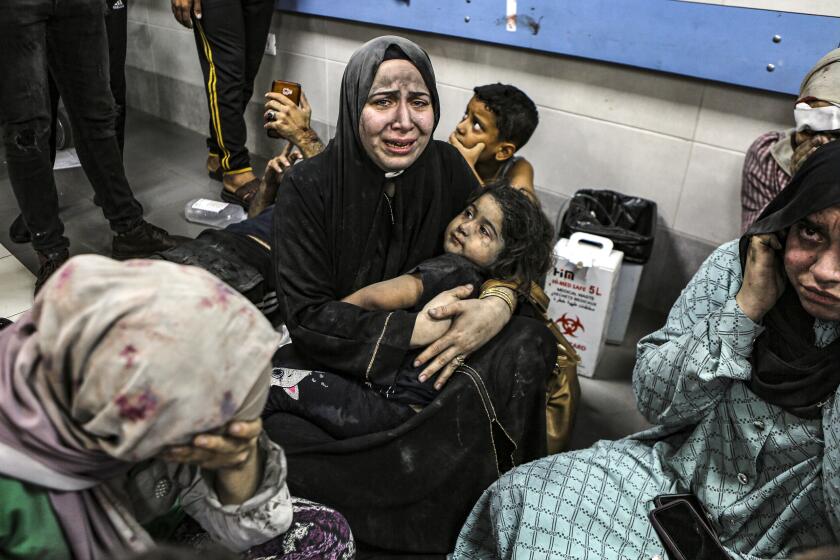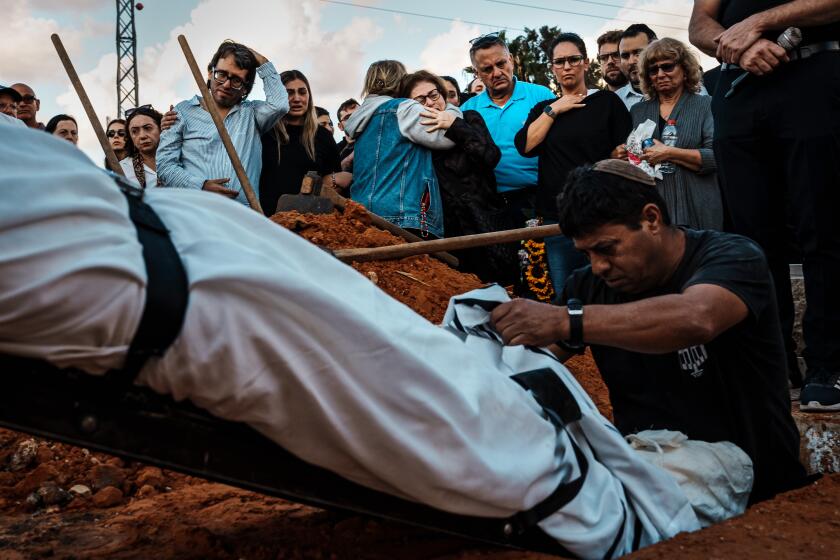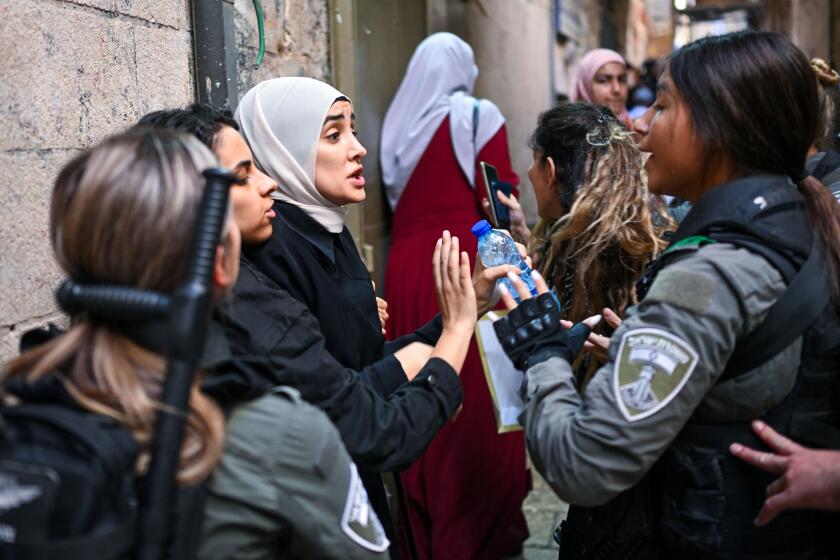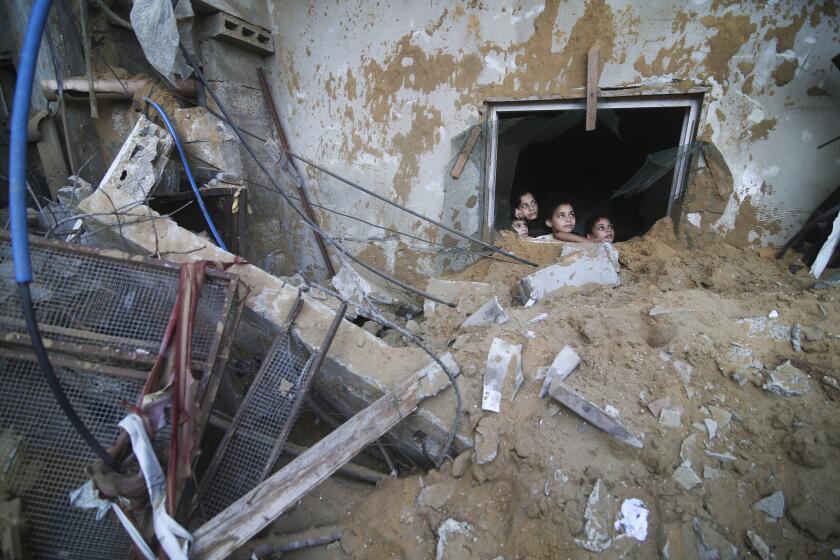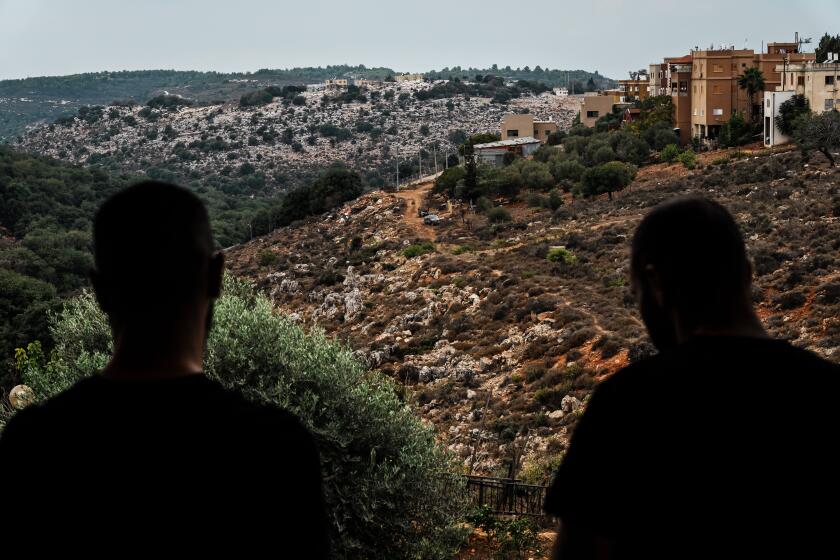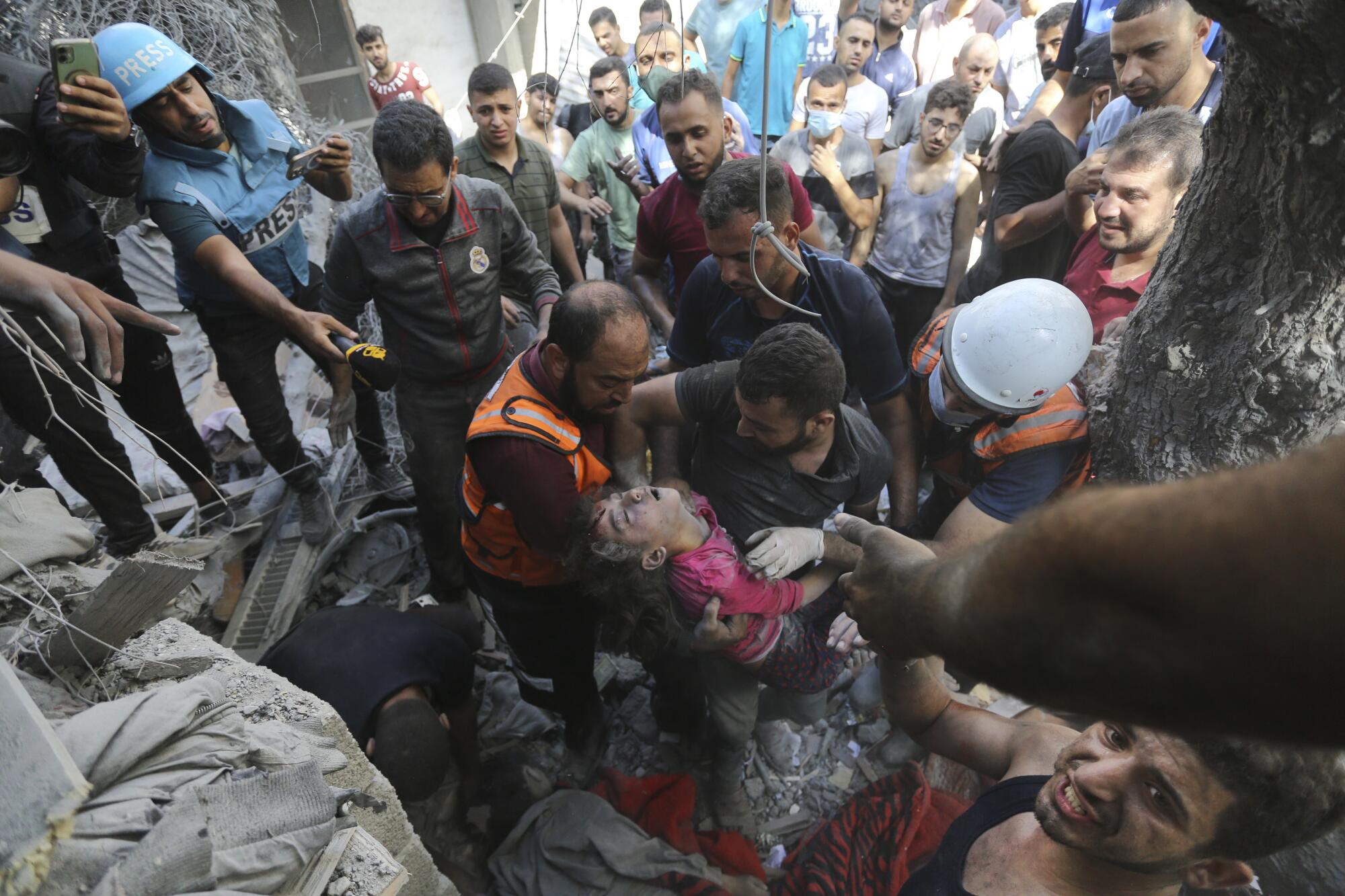
- Share via
RAMALLAH, West Bank — With each passing day, clashing narratives put forth by Israel and the Palestinian militant group Hamas about their bloodiest war to date have diverged ever more dramatically.
But a dozen days into the conflict, after a lethal conflagration in the Gaza Strip, these dueling realities presented the starkest contrast yet — and underscored the danger that an already chaotic and unpredictable war could widen regionally.
In the Palestinian territories of Gaza and the West Bank and across the Arab world, furious condemnation of Israel erupted over the deadly blast Tuesday night on the grounds of a Gaza hospital packed with Palestinians driven from their homes. Hamas blamed an Israeli airstrike.
In Tel Aviv on Wednesday, a visiting President Biden firmly backed Israel’s contention that its forces did not cause the carnage at the Ahli Arab Hospital, one of Gaza City’s preeminent medical centers, although Israeli forces had for days been waging an intensive campaign of airstrikes across the coastal enclave.

Israel’s military said detailed evidence indicated that the powerful explosion and fireball, which left burned-out husks of cars and bodies and body parts scattered throughout the hospital compound, was caused by an errant rocket fired by the Palestinian militant group Islamic Jihad, which is fighting alongside Hamas.
Israel and the Palestinian militant group Hamas appear set to go head-to-head on the ground in Gaza. What’s each side’s endgame?
Biden’s vocal support for the Israeli version of events surrounding the hospital blast strengthened as his daylong visit went on. And throughout it, his expressions of solidarity in the wake of Hamas’ devastating Oct. 7 attack on Israel — its biggest one-day loss of life ever — were explicit and heartfelt.
“You are not alone,” he told Israelis.
Shortly after touching down at Israel’s international airport, where airspace was closed to make way for his arrival, Biden said it appeared the “other team” was responsible for the hospital blast, but added that more information was needed.
Israel-Hamas war: In Israel, a quest to identify unrecognizable bodies. In Gaza, bodies are piled and some stored in ice cream trucks as power fails.
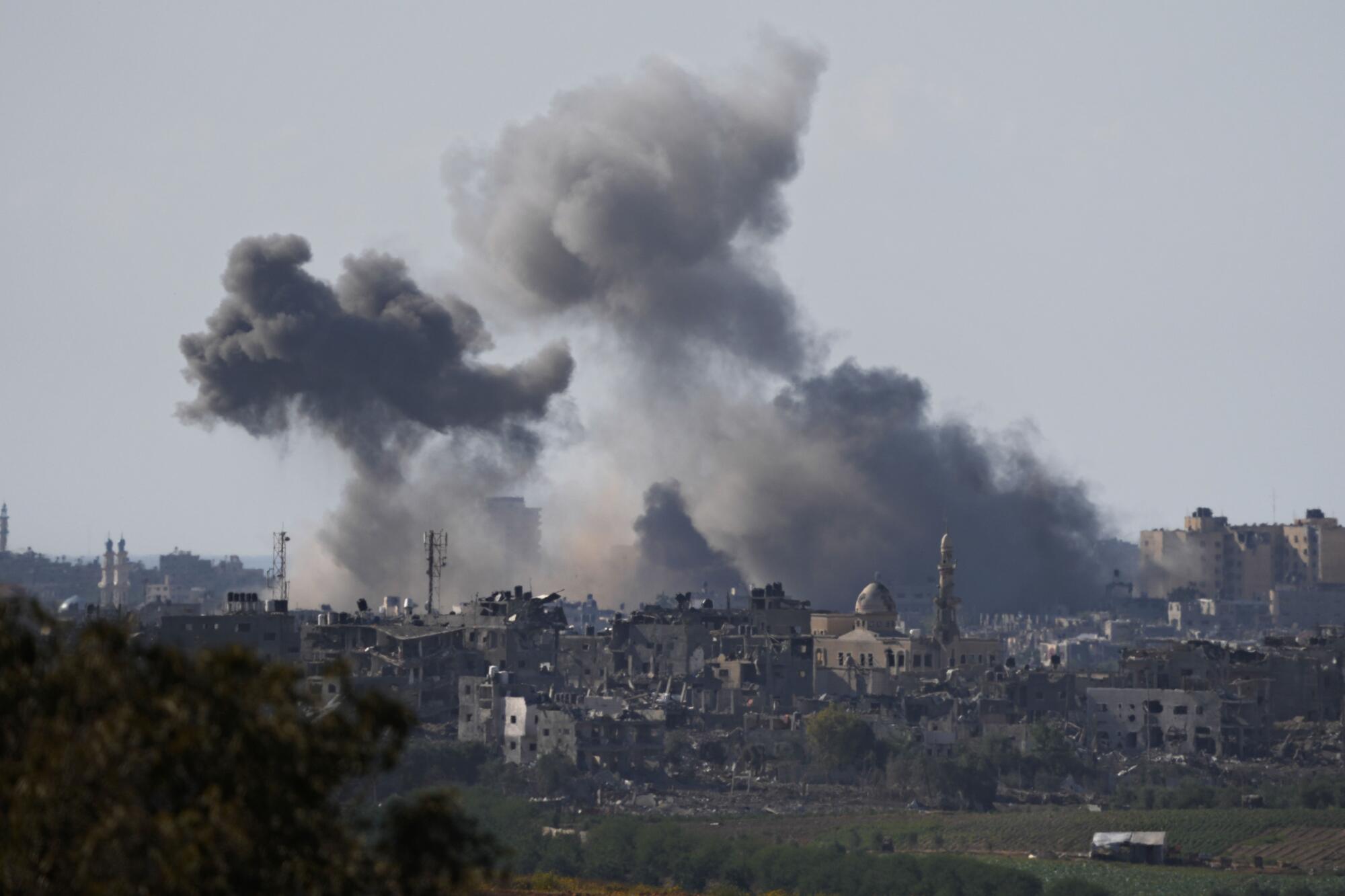
By day’s end, his tone was far less equivocal, citing a U.S. military evaluation of the explosion, which Palestinians said killed hundreds. American officials also pointed to intelligence including satellite and infrared data that implicated Palestinian fighters.
Across the Arab world, however, that message was largely dismissed — a sign of deep fissures over the conflict between Israel’s allies and its neighbors.
From diplomatic suites to the seething streets of West Bank refugee camps, Israel was universally blamed for the hospital deaths, with many voicing incendiary anger over its ongoing campaign of retaliatory air and artillery strikes on Gaza.
Street demonstrations broke out across the region — in Morocco, Jordan, Turkey, Tunisia, Lebanon and Iran — with protesters chanting slogans, burning Israeli flags and expressing bitter scorn for Israel and the United States alike.
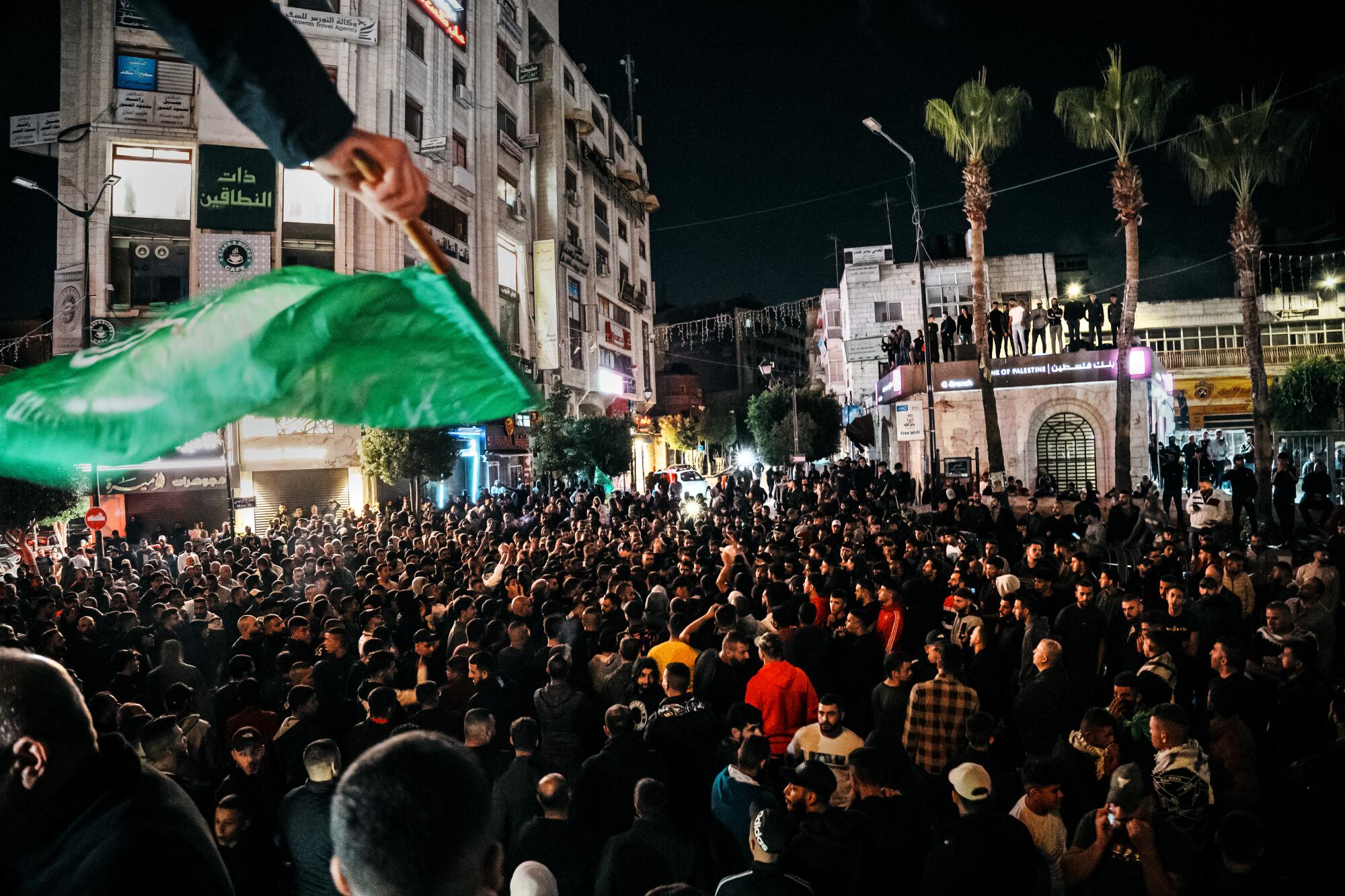
Even governments that had flirted with rapprochement with Israel, including those of Saudi Arabia and Turkey, brushed aside Israeli denials of responsibility for the hospital deaths.
In the West Bank, protesters hurled rocks and shattered windows in the administrative capital, Ramallah, after the Gaza hospital was hit, and in predominantly Palestinian East Jerusalem, a crowd threw firebombs at Israeli police. Palestinian officials called a general strike Wednesday, and most people stayed inside, with shops and businesses locked tight.
As the Jewish Sabbath fell and Muslims marked their principal prayer day, Israelis and Palestinians struggled with the terrifying new reality after the militant group Hamas’ deadly attack on Israel.
Sitting by his son’s grave in the Jenin refugee camp’s cemetery in the northern West Bank, a Palestinian named Nabil abu Sabbah vented bitterness at the mere mention of the visiting U.S. president.
“Look at the Israelis, what they’re doing to us, and the Americans are helping them!” he said. “The Israelis do it, and they blame us? And Biden believes them immediately?”
The bloody events that ignited the war were less subject to dispute — in part because Hamas fighters who breached Israel’s border fence with Gaza on Oct. 7 recorded their violent assaults on Israeli civilians and gleefully touted the gruesome killings on social media.

The Hamas attack left at least 1,400 dead on the Israeli side, more than 1,000 of them civilians, and marked the deadliest day for Israel since the country’s war of independence.
But among Palestinians, the emphasis swiftly pivoted to Israel’s punishing airstrikes in Gaza. In combination with a cutoff of electricity and fuel and a critical shortage of food, medicine and water in a territory where movement of goods and people has long been restricted, the bombardment swiftly escalated widespread misery.
Against that backdrop of desperation, the hospital tragedy propelled the conflict into a dangerous new phase, causing the largest single loss of Palestinian civilian lives since the start of the war and bringing the total to nearly 3,400, according to Gazan officials.
In keeping with a grim pattern in past Israeli wars with Hamas, concentrations of Gazans seeking refuge are often the most vulnerable and proved so again.
By the time the hospital was hit, Israeli calls for the evacuation of northern Gaza before a potential ground invasion had sent hundreds of thousands of Palestinian civilians fleeing for hoped-for havens — with hospitals a favored destination. At the time of Tuesday night’s blast, the tree-shaded compound of the hospital that was hit was packed with displaced Gazans.
Harrowing accounts of the carnage at the compound quickly spread in videos and via witness accounts. The multistory building was engulfed by fire, with blackened, mutilated corpses, including those of children, scattered about its courtyard.
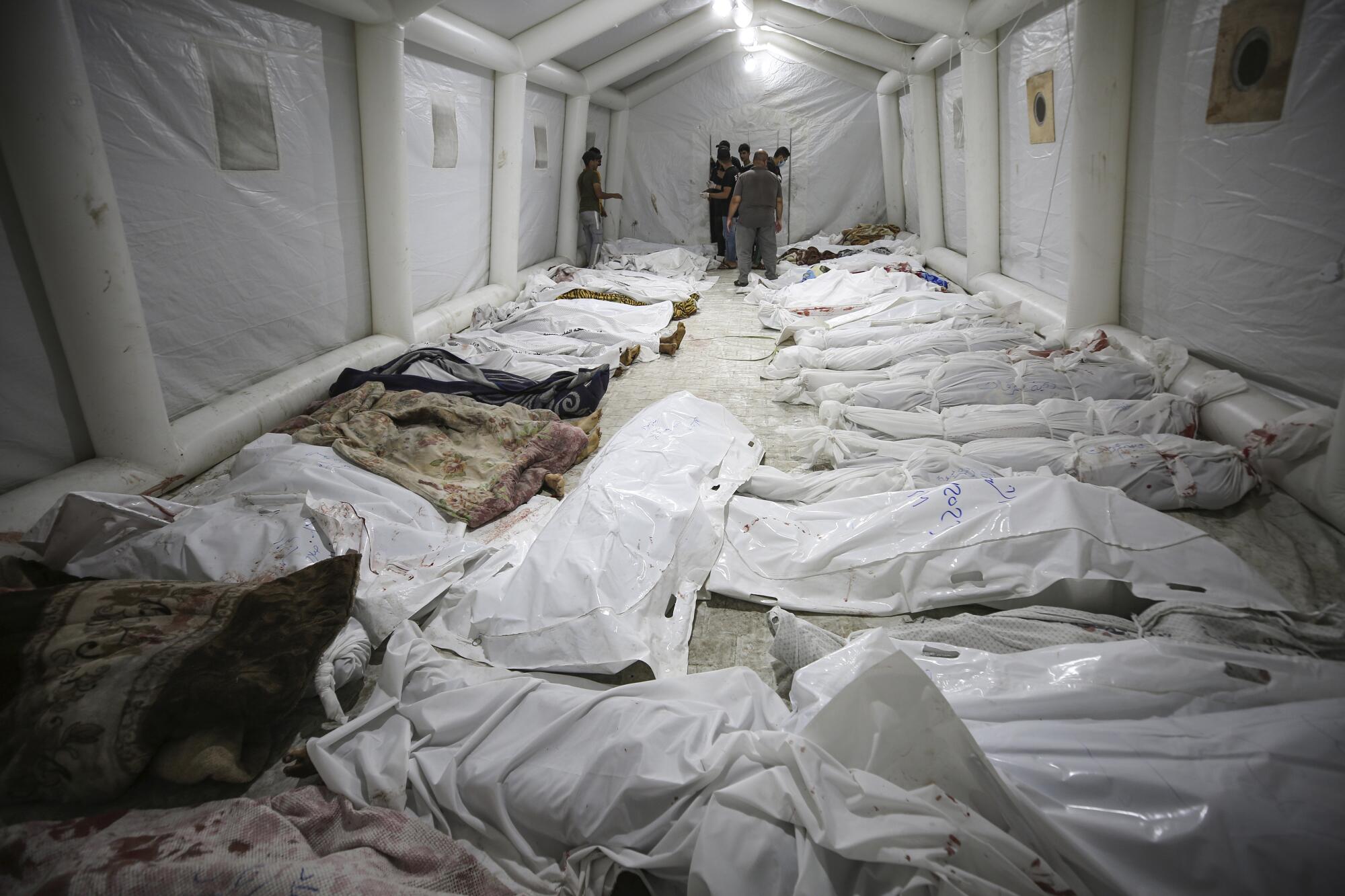
“We were operating in the hospital. There was a strong explosion and the ceiling fell on the operating room,” Ghassan abu Sittah, a doctor with the medical charity Doctors Without Borders, wrote in an account on Facebook. “This bloodshed must stop. Enough is enough.”
The Biden visit ended with a pledge by Israel that it would allow Egypt to deliver some humanitarian aid to Gaza, but in limited quantities.
Hundreds of Palestinian Americans are reportedly stranded in Gaza, frantically searching for ways to flee before Israel’s expected ground assault.
Prime Minister Benjamin Netanyahu said the step was taken at Biden’s behest. However, Egypt had not yet said whether it would allow deliveries through the crossing at its border, and Israel warned that any provisions bound for Hamas would be “thwarted.”
But if the gesture was meant to calm the waters, the mood among both Israelis and Palestinians remained ominously vengeful.
Or Tzuk, whose parents were killed in the southern Israeli community of Otef, told Israel’s Channel 13 that Gazans were not deserving of relief.
On Israel’s border with Lebanon, residents are worried that groups like Hezbollah will join a war that eventually spirals into a regionwide conflict.
“My parents were not granted a humanitarian corridor,” he said.
After nightfall Wednesday, Palestinian demonstrators, mainly young men, assembled in Ramallah’s main square, one of them waving a green Hamas flag. None was willing to entertain the idea that anyone but Israel was at fault for the Gaza bloodletting.
“I came here for Gaza,” said a 20-year-old named Ahmed. “For the martyrs.”
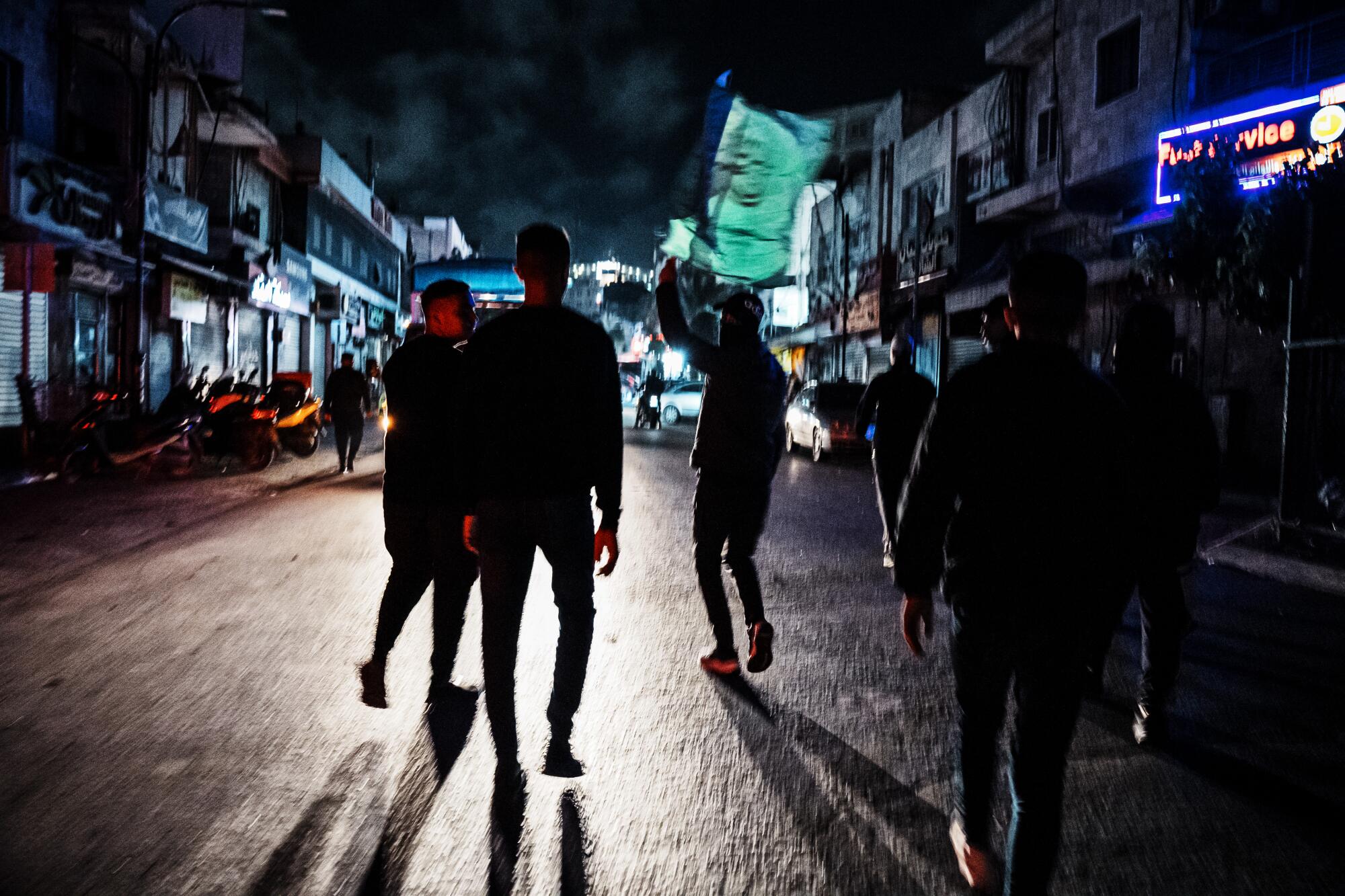
A 35-year-old protester who identified himself only as Ibrahim carried his 6-year-old son, Jad, on his shoulders.
“The Americans are lying,” he said, as his other son, 9-year-old Jihad, looked on.
“They always lie. I don’t believe them in anything.”
Bulos reported from Ramallah and King from Jerusalem. A special correspondent in Gaza, who cannot be named for security reasons, contributed to this report.
More to Read
Sign up for Essential California
The most important California stories and recommendations in your inbox every morning.
You may occasionally receive promotional content from the Los Angeles Times.
